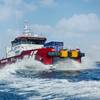In a June 3 letter to Office of Management and Budget
Director Mitch Daniels, 23 members of the United States Senate, two of which chair
key Senate committees, have expressed their strong opposition to the proposal
in the FY 2004 budget to assess between 25 and 50 percent of the Inland
Waterways Trust Fund to cover not only the currently mandated costs of new capital
improvements and major rehabilitation on the inland system, but also the costs
of operating and maintaining the nation's inland waterways. The senators -
John Breaux (D-LA); Arlen Specter (R-PA); Mary Landrieu (D-LA); John Warner
(R-VA, Chairman, Senate Armed Services Committee); Jim Bunning (R-KY); Jim Inhofe
(R-OK, Chairman, Senate Committee on Environment and Public Works); Kitt Bond
(R-MO); Mark Pryor (D-AR); George Allen (R-VA); George Voinovich (R-OH); Rick
Santorum (R-PA); Mitch McConnell (R-KY); Patty Murray (D-WA); Peter Fitzgerald
(R-IL); Richard Shelby (R-AL); Dick Durbin (D-IL); Jeff Sessions (R-AL); Mike
DeWine (R-OH); Jim Talent (R-MO): Maria Cantwell (D-WA); John Rockefeller
(D-WV); Trent Lott (R-MS) and Blanche Lincoln (D-AR) - represent a broad
bi-partisan coalition of key legislators from a cross section of the country.
Barge and towing operators currently pay more than $100 million annually into
the Inland Waterways Trust Fund through a fuel tax of 20 cents-per-gallon.
These funds, after being matched by general revenue funds from the federal
government, have been dedicated by law to underwrite the cost of constructing
locks and dams on the inland waterway system and major rehabilitation. Instead of
being used immediately as originally intended to rebuild
Congressionally-approved inland projects, more than $400 million in inland Trust Fund receipts
have been allowed to accumulate and remain unspent in the Trust Fund as our locks
and dams continue to erode. The President's budget request calls for the
Trust Fund to be tapped for not only construction and major rehabilitation on the
inland waterways system, but also for operating and maintaining the system,
which has been a federal government responsibility since the founding of the
nation.
"This proposal breaks faith with port and waterways users in that it would
vacate an historic agreement between these users and the federal government that
affirmed a shared responsibility for the future of the Nation's ports and
waterways," the letter states.
"In addition, we believe that the proposal will have a definite adverse
impact on trade and commerce, international competitiveness, and our economic
security. The inland waterways system annually moves some $30 billion worth of
agricultural products, petroleum, coal, salt, chemicals and other bulk
commodities which are generally described as the 'building blocks' of the U.S. economy,"
the letter continued.
While not the sole user of the waterways, the barge and towing industry is
the only segment of users that pays for the modernization of the waterways'
infrastructure. In addition to the 20 cents-per-gallon paid into the Trust Fund,
barge companies also pay an additional 4.3 cents per gallon diesel fuel tax,
which is deposited into general revenues.
As slated under the new budget request, for the first time a portion of the
Harbor Maintenance Trust Fund would also be used for waterways improvements as
well as for operations and maintenance of the nation's coastal ports. "Ports
handle 95 percent of the nation's overseas commerce by volume and facilitate
the rapid mobilization of U.S. forces. The proposal will eventually lead to a
new or increased tax rates, large transportation cost increases for the
movement of agricultural and energy products, and a freight shift from waterborne
transportation to congested highways and rail lines. The resultant damage to
river-dependent communities and ports will hurt the Nation's economy and
negatively impact U.S. competitiveness," the letter said.
"We are very encouraged by this letter from key members of the U.S. Senate
opposing the President's budget proposal. Our nation's barge and towing
industry, and ports, use the nation's waterways to transport 16 percent of the
nation's freight for just two percent of the freight transportation cost. This
saves shippers and consumers more than $7 billion annually compared to alternate
transportation modes and keeps our great nation competitive. In this time of
economic uncertainty, this proposal is misguided," said Barry Palmer, President
of Waterways Work!
Sponsored Content
Experience Custom Yacht Signs and Designs Tailored to Perfection!

Featured videos

FloCloud: Tracking, Documenting Weld Efficiency

Energy Transition in Maritime is More than the Fuel
April 2025
 Read the Magazine
Read the Magazine

 Read the Magazine
Read the Magazine
This issue sponsored by:

Modernizing Mariner Credentialing: A Maritime Workforce Imperative
Subscribe for
Maritime Reporter E-News
Maritime Reporter E-News is the maritime industry's largest circulation and most authoritative ENews Service, delivered to your Email five times per week







